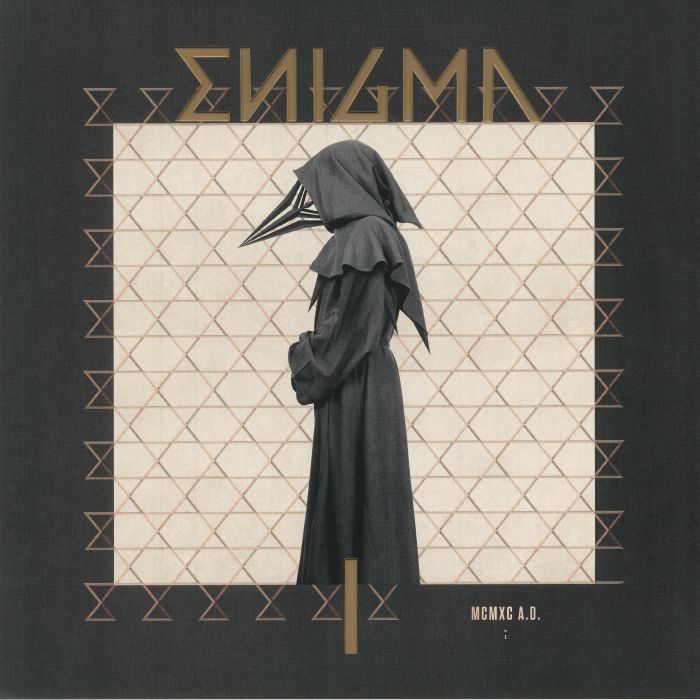Dusted Down – Enigma’s MCMXC AD (UMC)
Hugely controversial – but even more hugely popular…

The biggest German act of the last 30 years, Michael Cretu’s Enigma project began in the 1990s, selling over 70 million records, landing more than 60 chart number ones around the world and nabbing more than 100 platinum awards. It’s no surprise Universal are in the process of reissuing plenty of their highest-selling albums, their debut ‘MCMXC AD’ being the most obvious choice in the gamut.
Enigma were pioneering, spurring many new trends and phrases. After their first commercial appearance, ‘enigmatic’ became a popular term to refer to non-limelighty artists. ‘Project’ caught on, denoting non-individualistic acts. And – last but not least – there was ‘worldbeat’, which was the body-swaying fusion of Balearic and downtempo beats with ‘world’ music samples.
Despite his influence, Cretu is one of the most controversial figures in electronic music. Mired in copyright battles over unsolicited samples on some of his most well-known singles – including this project’s very own ‘Sadeness’ and the later ‘Return To Innocence’ – he only ever escaped these headbutts through the skin of his teeth, managing to pay off the Gregorian chant choir Antiqua München for infringing their “right of personality”, and claiming not to have been aware that the pair of Taiwanese singers’ voices, used in the latter song, were not in the public domain.
‘Worldbeat’, it must be mentioned, is a problematic term. Given the context of Enigma’s unsolicited sampling, the genre name somehow manages to sound worse than its simple, umbrella parent term ‘world’, with the ‘beat’ suffix wafting an extra air of appropriation.
But mistakes were acceptedly made, and wrongs corrected. And Engima’s sound, besides all the clamour around it, is itself not problematic. It is, in fact, rather good. It laid down a style so specific in mood that it still causes fingers to click and hips to sway, and always begs the question, “what is this tune again?”. One happily Chinese-whispered term to describe this album is ‘monk sexuality’, referring to the music’s sultry moods, which are combined with unlikely religious puritan and monastic themes. Besides the obvious ‘Sadeness’ and Enigma’s monkish image (the single version of ‘Sadeness’ bares the visage of a particularly austere-looking monk), this can be heard everywhere. If there aren’t devotional vocal samples populating a particular moment in a track, then rest assured, there’ll at least be some divine droning, choral pad going on in the background.
It’s Cretu’s then-partner and singer, though – Sandra Cretu – who ensures the album’s squintiest and steamiest moments. A loungier tune, ‘Callas Went Away’, is a nuggetlike example of her multilingual songwriting. Sandra’s lyrics are a tribute to the soprano singer Maria Callas, spanning both her blessing in English, and original vocals in French (“These letters! These letters!”). Elsewhere, we notice that Enigma’s sampled, Latin vocals are expertly chosen: the mystical ‘Knocking On Forbidden Doors’ hears talk of “Jesus, the blessed fruit of your womb”, with this suggestive Biblical reference once again oozing a sacred, yet not-mutually-exclusive religious sexuality.
This being 1990, it’s easy to hear a ‘future ghost’ of rave in the music – specifically in the interplay between Sandra’s voice and Michael’s beatsmithing. Take ‘Mea Culpa’, the calculated follow-up track to ‘Sadeness’. On it, military snare rolls signal a driving Matrix-soundtrack-worthy breakbeat, while preset flutes from the E-mu Emulator II – a floppy-disk optimised digital sampler from the ‘80s – resound in tinny, playful glory. But for the most part, there’s something in the track’s tense minor-second chords – and its hypnotic, repetitive rhythm – that makes it sound like a precursor to a ravey FSOL obscurity, or some ambient moment in a breakbeat hardcore tune made a few years later (when that scene was more in vogue).
By the album’s end track – titled, ahem, ‘Back To The Rivers Of Belief: Way To Eternity / Hallelujah / The Rivers Of Belief’ – the Enigma formula is laid bare. Auto-sensory bells, breakbeaty drums and droning arpeggios once again make themselves heard. But on this final movement, Cretu himself is singing, giving the whole thing a proggier bent and justifying his well-documented citing of the band Yes as an influence. Like many other small details heard on this album, it shows that Enigma today are so much more than just an obvious choice for the new age revivalist DJ of 2021. No, MCMXC AD – despite its formula and problems – is a slice of musical history, capable of inducing states of deep entrainment and sexual reverie.
Jude Iago James